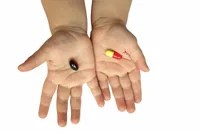A scrape on the knee is easily fixed with a Band-aid and gentle kiss. Parents look forward to these rare moments when we can help mend our children without too much trouble. And it is when our children become ill that we try our best to make them well.
Lately, a lot of parents have been turning to over-the-counter (OTC) herbal products to help fight infections, boost immune systems, and cure a variety of ailments. While the intentions are good, the results can be tragic. An extreme case involved an eight-week-old infant who suffered from multiple organ failure and swelling of the brain after ingesting a toxic home-brewed mint tea. The parents unknowingly used the toxic pennyroyal plant to treat a suspected viral illness and their baby later died as a result.

Herbal products are often mistakenly associated with “safe and natural” cures for a variety of conditions. However, the term “herbal” simply refers to a product that comes from a plant. Many dangerous drugs are derived from plants, such as the potent blood thinner warfarin, which was originally used as a rat poison. While many herbals are relatively harmless, following are important reasons for emphasizing caution, especially when using them in children:
• Insufficient studies in the pediatric population: There are not enough well controlled studies to substantiate the safety and effectiveness of most over-the counter herbals in children. And kids in general are more sensitive to adverse effects from herbals since their central nervous and immune systems are still developing.
• Lack of standardization: A given batch of product can vary in strength, purity, and effectiveness setting the stage for a potential overdose or bacterial contaminant. In the United States, herbal products do not have to be proven safe or effective. It is only after a product has been proven to cause harm that it is taken off the market. Hard to believe, but true.
• Potential for allergic response: Since herbals are derived from plants, there is always a potential for an allergic response, especially in children with a history of allergies. For instance, kids who are allergic to ragweed should avoid any herbals containing chamomile since both plants are members of the compositae family.
If you do turn to herbals, there are a couple of important tips to follow:
• Always consult your child’s pediatrician: Your child’s doctor will help you weigh the benefit versus risk when it comes to utilizing OTC herbals. She can also make an informed, professional decision based on published studies and references concerning the proper dose and duration of therapy if an herbal is warranted.
• Look for the USP seal: There are a handful of herbal manufacturers that have agreed to participate in the USP (United States Pharmacopeia) verification program. Under this program, the USP evaluates a product for its integrity, purity, dissolution, and safe manufacturing processes, and those that pass receive the USP-verified seal on their bottles. In other words, those herbals that contain the USP seal are not likely to cause harm while those products without the seal are purely a case of “buyer beware”.
When it comes to our children’s well being, it’s best to err on the side of caution. Just remember that old and very wise saying, “If it sounds too good to be true, it probably is.”
Visit the FDA website (www.fda.gov) for the latest information on food and drug recalls.
DR. TARA KOMPARE is a doctor of pharmacy and mother of two little girls. Her book, The Colic Chronicles (Da Capo Lifelong), is scheduled for release this summer. www.themedicinemom.com; drk@themedicinemom.com.



















